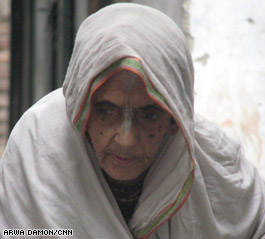As expected, readers are horrified by the backwards and inhumane treatment of these women -- 40 million in India, and 15 thousand on the streets of Vrindavan. Some blame Hinduism or the Vedic scriptures for this cruel practice. Others say that it is all about money and greed.
As Gaudiya Vaisnavas we hold Vrindavan to be sacred ground -- Lord Krishna's own abode. How do we reconcile that belief with the adharmic treatment of thousands that is purportedly happening there? Can we or should we do something about it? Or is this just a case of a pro-Westernized, anti-Hindu media slant, hyping a story where there really is none? Is this an opportunity for ISKCON to be proactive and take a stance, or an embarrassment that we should hope just goes away?
In any event, one thing is clear: even if we don't have the answers on this one, we must be willing to face the questions.
Here is the beginning of the article:
by Arwa Damon; CNN
VRINDAVAN, India (CNN) -- Ostracized by society, India's widows flock to the holy city of Vrindavan waiting to die. They are found on side streets, hunched over with walking canes, their heads shaved and their pain etched by hundreds of deep wrinkles in their faces.
Hindu widows are shunned from society when their husbands die, not for religious reasons, but because of tradition -- and because they're seen as a financial drain on their families.
They cannot remarry. They must not wear jewelry. They are forced to shave their heads and typically wear white. Even their shadows are considered bad luck.
Hindus have long believed that death in Vrindavan will free them from the cycle of life and death. For widows, they hope death will save them from being condemned to such a life again.
"Does it feel good?" says 70-year-old Rada Rani Biswas. "Now I have to loiter just for a bite to eat."
Biswas speaks with a strong voice, but her spirit is broken. When her husband of 50 years died, she was instantly ostracized by all those she thought loved her, including her son.
"My son tells me: 'You have grown old. Now who is going to feed you? Go away,' " she says, her eyes filling with tears. "What do I do? My pain had no limit."
As she speaks, she squats in front of one of Vrindavan's temples, her life reduced to begging for scraps of food.
There are an estimated 40 million widows in India, many of them shunned and stripped of the life they lived when they were married.
It's believed that 15,000 widows live on the streets of Vrindavan, a city of about 55,000 in northern India....
(read the whole story here, at CNN.com)
![]() Watch how some widows are rebelling »
Watch how some widows are rebelling »

No comments:
Post a Comment